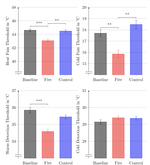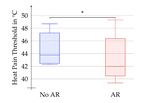Cognitive and Perceptual Effects of Augmented Reality

Augmented Reality (AR) is an interactive technology that modifies the users’ perception of reality by overlaying virtual sensory stimuli or altering/eliminating real sensory information. When virtual stimuli align with the remaining sensory inputs and are experienced in a manner that closely resembles the real-world, they can elicit responses typically associated with the corresponding real stimuli, leading to the creation of illusory percepts.
My doctoral research explores a novel cross-modal illusion in AR known as the Burning Hand Illusion. During this illusion, participants are given visual and auditory stimulation that create a vivid, realistic impression that one of their hands is engulfed in flames. Interestingly, some participants report experiencing cutaneous sensations of heat or tactile stimulation in response to the virtual audio-visual flames.
I presents a comprehensive study of three experiments designed to elucidate the neurophysiological and physiological correlates of the Burning Hand Illusion and its perceptual effects.
The first experiment examines the autonomic nervous system’s response to the Burning Hand Illusion, demonstrating heightened activity through increased skin conductance and pupil dilation responses.
In the second experiment, we investigate the neural correlates of the illusion using electroencephalography. This study unveiled activations in both the fronto-parietal network and a network typically associated with thermal perception.
A third experiment confirmed that the Burning Hand Illusion is capable of modulating the nociception and thermoception of real thermal stimuli. The results demonstrate that the illusion decreased heat pain thresholds, warmth perception thresholds, and increased cold pain thresholds.
These findings have important implications for the development of therapeutic AR applications in areas such as pain management, neuro-rehabilitation, as well as the scientific exploration of neural mechanisms underlying cross-modal illusions.


![[DC] Psychophysical Effects of Augmented Reality Experiences](/publication/eckhoff-2021/featured_hu23581d21a3fd77f5f9e942349bbddb09_887548_150x0_resize_lanczos_3.png)


